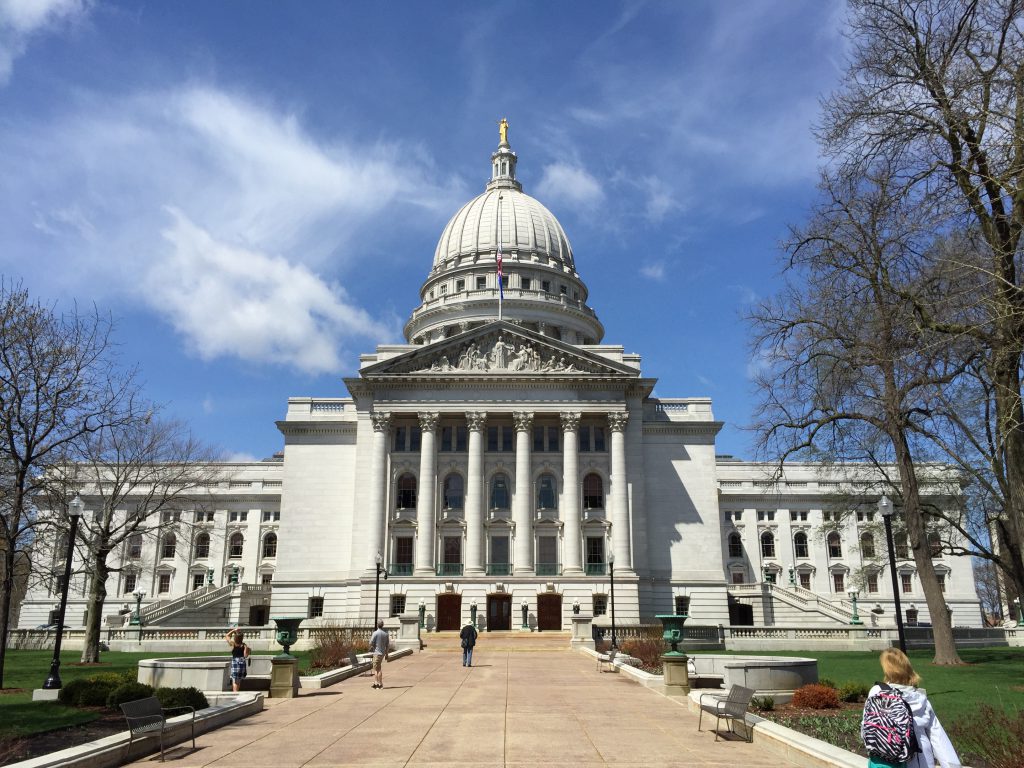Voters Could Return Divided Power to Capitol
But will it mean compromise -- or deadlocked government?
For a decade, Republican Gov. Tommy Thompson kept a wary eye on Democrat Attorney General Jim Doyle, whose Capitol East Wing office was next to the governor’s. Between 1991, when Doyle took office, and 2001, when Thompson resigned to go to Washington, the governor and the state’s chief lawyer and law enforcement official competed on many levels.
Thompson knew the ambitious Doyle wanted to run for governor. Doyle finally did, in 2002, and served two terms.
But Doyle knew Thompson’s exuberant dealmaking could cross the line, embarrass state government or get it sued – a lawsuit Doyle’s Justice Department would have to defend. Doyle also looked for campaign issues to use against Thompson, if the two ran against each other in a 2002 campaign for governor.
There was a healthy check-and-balance in the tension between a Republican governor and a Democratic attorney general.
Whether you call it “shared power” or “divided government,” Wisconsin has a long tradition of ticket splitting that has forced leaders of both parties to compromise on major public policy.
But power sharing hasn’t happened in the Capitol for 10 years.
In the 2009-10 session, Doyle was governor and Democrats had majorities in the state Senate and Assembly.
Those Democrats had to govern in the aftermath of the Great Recession, which forced them to make unpopular decisions that led to the November 2010 election of Republican Gov. Scott Walker and Republican majorities in the Legislature. Republicans have run the executive and legislative branches of state government ever since.
By that standard, the Capitol is overdue for a return to divided power. And it could happen after Nov. 6, when the next governor, attorney general and 116 of the 132 seats in the Legislature will be filled.
For confrontation-weary voters who long for compromise, that would be a good thing. For example, Walker may be reelected but have to deal with a Democratic Senate majority. Walker has never had to negotiate with Democrats in control of half of the Legislature.
Or, Democrat Tony Evers could be elected governor, but have to get his 2019-21 budget — including spending on K-12 schools, health care and transportation — through an Assembly likely to be still controlled by Republicans.
Another possible scenario: Evers wins, but so does Republican Atty. Gen. Brad Schimel. So, in a reverse of 1991-2001, a Democratic governor has a Republican attorney general looking over his shoulder.
Back in January 1987, Thompson became governor – and faced a Legislature run by Democrats. In his new book, My Journey of a Lifetime, Thompson wrote that he had to signal that he was serious about all the changes he wanted made, so he shredded the Legislature’s budget with a record 290 vetoes.
Another example of divided state government is state Senate control that shifted three times in five years because of special elections: April 1993 special elections gave Republicans Senate control by a 17-16 margin. June 1996 elections shifted control to Democrats by that same margin. But April 1998 elections gave that 17-16 edge back to Republicans.
Marquette University pollster and Law School professor Charles Franklin said the university’s polls have consistently showed a close divide when those surveyed are asked to align with a political party.
“Divided government was the norm in Wisconsin for several decades prior to 2011,” Franklin said last week. “When each party has a say in legislation it is harder to pass, but also more likely to be acceptable to both parties.”
But Franklin and UW-Madison Political Science Professor Katherine Cramer, who wrote a book based on talks with hundreds of Wisconsin residents in restaurants, coffee shops and homes, warned that divided government may no longer result in compromise.
Franklin said, “With highly polarized parties, this may mean deadlock over most legislation, rather than a new spirit of compromise.”
Cramer added: “I think power sharing is harder than ever because so many of our divides map cleanly onto partisan divides these days; more than before in any of our lifetimes.”
“So many divides — ideological, racial, socioeconomic — are now consistent with the party categories that now there are few things to bridge across them,” Cramer noted.
“For example, it used to be the case that many Republicans called themselves liberals and moderates, and many Democrats called themselves conservative and moderate. That just isn’t the case anymore.”
Steven Walters is a senior producer with the nonprofit public affairs channel WisconsinEye. Contact him at stevenscotwalters@gmail.com
The State of Politics
-
RNC Brings Fame to Gen Z Party Leader
 Jul 15th, 2024 by Steven Walters
Jul 15th, 2024 by Steven Walters
-
Wisconsin’s Republican Roots Run Deep
 Jul 8th, 2024 by Steven Walters
Jul 8th, 2024 by Steven Walters
-
Feuding Supreme Court Justices Need a Break
 Jul 1st, 2024 by Steven Walters
Jul 1st, 2024 by Steven Walters





















